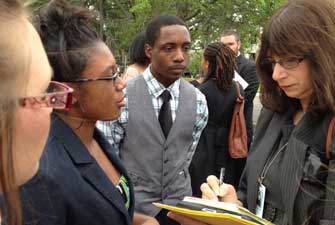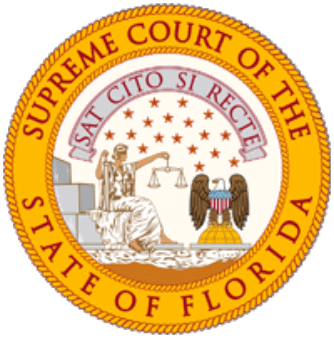
The abuse Manushka Gilet suffered from the age of 12 at the hands of her stepfather did not stop her from engaging in a wide range of school-sponsored activities as a teenager; it took the laws then governing the foster-care system to do that.
“I’m a very active child. I do debate team, mock trial, swimming, track and field, ballet, all these crazy things,” Gilet said. “When I got into foster care, I wasn’t able to do anything. It was very difficult for me to do anything because everyone was very worried about their liability.”
Until this year, Florida’s foster-care system required kids to get caseworker approval and then go to court in order to participate in everyday activities that put them in contact with their peers and adults who were not their guardians. After-school clubs and extracurricular activities, sporting events, sleepovers and even prom — all were no-can-do without a court order. That’s a pretty big stumbling block for a kid. Worse yet, foster youth were in the awkward position of having to ask if their friends’ parents wouldmind getting fingerprinted and having background checks before they could hang out at their homes.
“It makes you feel like you are an outlier, like you are not a part of something, like you are missing out on something that could be a wonderful experience,” Gilet, 17, said of the system of rules that had long governed Florida’s foster youth. “It inhibits us from excelling at anything, finding our niche, finding that place we feel comfortable in, finding ourselves.”
But through Florida’s Children First and a program called Florida Youth SHINE, Gilet helped change the system for the better.
Florida Youth SHINE is a youth-run organization that empowers current and former foster youth to become leaders and advocates within their communities. It is supported and advised by Florida’s Children First, which received a Children’s Legal Services grant of $124,504 from The Florida Bar Foundation in 2012-13 for its Children’s Systemic Initiative. The multi-faceted initiative focuses on improving the lives of youth, particularly those in the dependency system, through the development and dissemination of information resources and through efforts to influence public policy. Florida Youth SHINE is a key part of the initiative.
Gilet was one of more than 40 members of Florida Youth SHINE who traveled to Tallahassee during the 2013 legislative session to make their voices heard on two important pieces of legislation for foster youth.
SB 164, known as the “normalcy bill,” established that caregivers could apply a “reasonable and prudent parent” standard in deciding whether to allow a child in foster care to participate in extracurricular activities. It also protected them from liability. Meanwhile, SB 1036 gave foster youth the option of staying in care until age 21, whereas previously they aged out of the system at 18 even though that meant that 30 percent of foster youth were essentially on their own before graduating from high school.
The loss of stability for kids aging out at age 18 can have serious consequences. A 2005 study by the Chapin Hall Center for Children at the University of Chicago found that by age 19 one in seven former foster youth had experienced homelessness, while 25 percent could be categorized as food-insecure and 20 percent had been incarcerated. Meanwhile, those remaining in care were twice as likely to be enrolled in an educational program.
When talking to legislators about the importance of these issues to kids like her, Gilet felt she could almost see inside their heads.
“You could physically see it sink into their minds, through the emotion on their faces, and there was that moment that they were empathizing with us,” Gilet said. “Naturally, after they thought about it, they all agreed, and they said, ‘Wow. This needs to change.’ ”
And change it did. Both bills championed by Florida Youth SHINE passed with overwhelming bipartisan support. The vote on the normalcy bill was unanimous in both chambers.
“The personal testimony by the Florida Youth SHINE young people is what got this bill passed this year. Hearing their stories and meeting them in person certainly made me want to be their champion,” said Sen. Nancy Detert, R-Venice, Senate sponsor of the bill extending foster care to age 21. “In fact, it was an honor and a privilege to carry the bill for foster-care expansion. I hope they learned the lesson that one person really can make a difference.”
Gilet definitely learned that lesson. She called the experience “life-changing” and feels it has set her on a more determined course for her life.
“I realized that not only am I changing things for myself — like now at my home I don’t have to get background checks — but I am changing things beyond that, for other children in the future,” Gilet said.
“If a group of individuals tries to reach for a goal, it’s very possible, no matter child or adult. It kind of opened my mind to different prospects for myself and other individuals that also got to experience what I experienced. Although foster care isn’t easy, I am grateful for the system. I’ve grown a lot in it.”
All told, Florida Youth SHINE members attended 14 legislative committee meetings in 12 weeks and met with more than 60 legislators, according to Florida’s Children First Executive Director Christina Spudeas. They also prepared through intensive sessions in which they studied up on the branches of government and how a bill becomes law and learned how to advocate.
“These kids worked on this for three years. We went to the Legislature three years in a row. Having those kids’ voices, it made the difference this year,” Spudeas said, adding that the Foundation’s support was critical as well.
“The Florida Bar Foundation was instrumental in the establishment of Florida’s Children First and Florida Youth SHINE. Its initial funding and continued support has given the opportunity for both organizations to make positive systemic changes and to advance the voice of the youth.”




